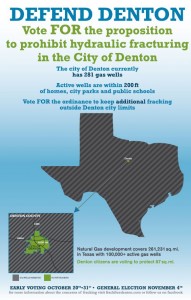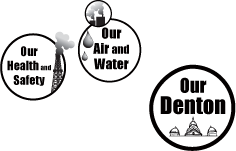Here is your one-stop shop to clear away all the industry propaganda. Please share it widely. We know once people get the facts, they will vote FOR the ban. Thank you!
Why should I vote for the fracking ban?
Simply put, without the ban fracking will continue unchecked all across Denton less than 200 feet from homes, schools, and playgrounds. The negative health and safety impacts of living close to fracking are well established. Fracking requires heavy truck traffic, poses risks of industrial-scale accidents (like the blowout in Denton last year), uses non-disclosed proprietary chemicals, and has permanently contaminated over 1 billion gallons of Denton’s fresh water.
No one, not even industry representatives, wants a frack site in their back yard. No one thinks this is responsible. But that is the reality without the ban, because our 281 gas wells and another 10,000 acres of city land are vested (grandfathered) under older regulations that were written when Denton was much smaller and before we knew the hazards of this process.
Denton actually has a set of reasonable rules in its city code. They require a 1,200 buffer between frack sites and homes. But the industry does not have to follow these rules. AFTER we wrote those rules, they continued fracking less than 200 feet from a neighborhood. And they have claimed they can do this over and over again “in perpetuity.”
We don’t even allow bakeries in neighborhoods. Why fracking?
But what about the economic impacts of the ban?
In our post “Grow Strong AND Healthy,” we tackle this question. We show three things:
- The industry-sponsored report about economic impacts of the ban relies on a group notorious for using its proprietary formula to gin up numbers that suit its clients preferred conclusions;
- Yet even if we take their numbers at face value, their own report shows that fracking is 0.2% of our economy, 0.2% of our work force, 0.5% of our tax revenues, and less than 0.2% of our school budget; and
- Their own numbers show that fracking is an economically unproductive use of land – building homes generates 4X as much tax revenue for roads and schools. Every acre of fracking means more pollution and less economic prosperity.
But what about the threats of lawsuits should the ban pass?
In our post “Of Lawsuits and Lies,” we tackle this question. We show three main things:
- Other US cities have defended their municipal fracking bans for between $38 and $125 thousand dollars. That is far less than the “millions” threatened by the industry. And it is 3% of Denton’s fund set aside for defending lawsuits in general.
- The ban will survive any preemption challenge, because Texas home-rule cities like Denton are proven in courts to be Texas tough – winning every challenge to their authority.
- The ban will survive a regulatory takings challenge, because it does not prohibit all forms of mineral development and a more restrictive ordinance in Texas was just upheld by the Texas Supreme Court.
But what about our schools and parks?
In our post “Vote FOR the Children. Vote FOR the Ban,” we tackle this question. Again, using industry’s own numbers we show that fracking contributes at most $20 per student in Denton Independent School District. That’s out of a budget of $7,700 per student. Meanwhile, fracking is a major contributor to the smog-forming ozone that gives our region the highest childhood asthma rates in the state.
In our post “Take our Parks Back,” we also tackle this question. We show that gas well funds constitute 1.2% of the Parks budget. We also show how the city explicitly classifies these funds as “short-term” and does not use them to maintain anything, including swing sets. Meanwhile, benzene is being emitted from a frack site by McKenna Park at unsafe levels, which keeps several parents and at least one private school from letting their kids play there.
But what about American energy independence?
In our post “Why Denton Should Ban Fracking,” we tackle this question.
If you crammed all of Texas’ gas wells into the 7 percent of its land area that is developed, Denton would still have three times as many wells as the average city. We’re doing far more than our fair share for energy independence. And our existing wells will continue to produce gas after the ban. Besides, the claim that fracking in Denton is helping the U.S. become more energy independent is a red herring. The U.S. only imports oil, not natural gas, from the Middle East, and Denton only produces natural gas. Water scarcity is the real national security concern here anyway.
Plus, fracking companies are scrambling to export American natural gas overseas to Asia where they can get higher prices.
But doesn’t this ban apply to all fracking everywhere?
No. The ban applies only within the city limits of Denton, TX. Why Denton? Again, because our city is in a unique situation where we tried for years to regulate this industrial practice only to find out that it is too late. This is not about national energy policy. This is not about what’s right for other places. This is about one community’s right to self-determination.






